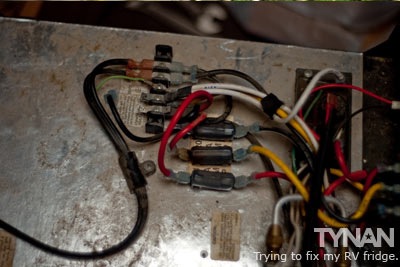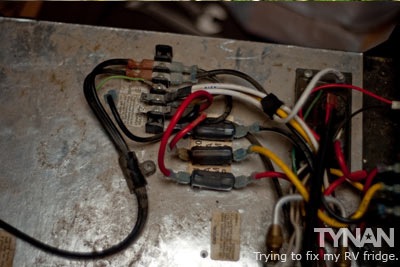
My last post on living in an RV has generated a bunch of questions by comment and by email. Instead of responding to them individually, I’m going to answer them all here.
How long did it take you to outfit the RV with solar power?
Putting solar power into an RV is a simple job, primarily because most things in an RV (everything that I use) runs of 12V DC power instead of standard household 120V AC power.
All solar panels produce DC power, and almost all RVs have coach batteries, so it’s simply a matter of hooking up a solar panel to a charge controller to the battery. If you get a really low powered solar panel, maybe just to power LED lights, you could connect directly to the battery without even getting a charge controller.
On my first RV I was going to have an RV shop install my panel for me, but they insisted on me physically leaving my RV at their shop for 2-3 weeks while it “waited in line” for the half day installation. I thought that was ridiculous, so I decided to try to install it myself. It was easy and took less than a day.
What do you do about cops and what not who hassle you? (I remember you talking about that) How does that typical encounter go? I think it would be somewhat obvious to the people around you that someone is actually living in the RV parked on their street.
Cops generally don’t hassle me. I had one incident in Austin where a nearby resident was making constant complaints because I was parked there for months at a time. I talked to the cop and made it clear that I knew the law, and he agreed to stop putting stickers on the windshield telling me to move.
Keep in mind that I intentionally bought the smallest RV I could find. If I had a 40′ behemoth, that might change things. Generally, though, you can park on the street for 72 hours at a time, and can just move to a nearby spot after that. Wash, rinse, repeat.
As a side note, finding parking is FAR easier than you’d expect. Even when we had the 40′ school bus, it wasn’t all that bad. I’m in Hollywood right now and within a week have already found three streets that always have parking available.
How about privacy and what not? I don’t think I would feel so comfortable with noises and rocking while I’m doing the hanky panky.
It’s really just not an issue. RVs have stiffer springs than cars, so I don’t think rocking is a huge deal. If you close the windows, people outside can’t hear too much. Also, when you have all the shades drawn, people tend to assume the RV is just parked and empty… people don’t wait around by the windows to see if they can hear anything.
I randomly drove from Cali to NY, and crashed a few nights in the back of my Scion tC. It wasn’t a comfortable sleep at all though because it got really cold. I wonder if your RV has good insulation, a heater, or if you just use a ton of blankets.
The RV does have insulation, and sleeping on a mattress helps a lot. After all, a mattress is basically several inches of dense insulation. I also have a down comforter, and a heater. Using a catalytic heater like an Olympian Wave 6, you can inexpensively and comfortably heat an RV in the winter.
A question though, do you have a toilet in the RV, and so where do you throw excrement?
I do have a toilet, as well as a shower and two sinks. The waste from the toilet is held in a 12 gallon tank, and the water from the sinks is held in a separate 7 gallon tank. The shower used to drain into the toilet tank, but I rerouted it outside. This is technically illegal, but it’s just water and biodegradable soap, so I’m not worried about it.
Every 6-7 days or so I drain the tanks, usually at an RV park. They charge $5-15 for the privilege. The process is actually very easy and sanitary and takes no more than fifteen minutes. At the same time I also replenish my 20 gallon fresh water supply.
While on the highway, it’s even easier. Many truck stops, including every Flying J, have dump sites that you can use for free. Los Angeles is the toughest place so far… I have to drive 20 minutes to an RV park near the beach.
Ty, how about the internet access?
I have a Sprint Mifi 2200 card. This tiny device connects to Sprint’s mobile broadband network and acts as a wireless router. Besides my laptop and guests’ laptops, my GPS can also connect to the Wifi and use it to get traffic reports. Download speeds are about 100-300 kilobytes/sec and the cost is $60/ month (I get it for less because I got a discount).
I also have a crank up antenna on the roof whose direction can be controlled from the inside. I’m thinking about putting a cantenna on it and wiring it to a router inside the RV. This would allow me to pull in unsecured wifi signals and download at much higher speeds when I’m in urban areas.
What’s not great about the RV?
There are a few things that aren’t ideal about living in the RV. The biggest one is that stuff breaks. My fridge just randomly stopped working (hence the picture at the top), so now I have to tinker and try to fix it. When things break on the car part of it, I’m homeless for a day or two while the shop fixes it.
Also, It’s just not good for hot weather. If the weather goes over 95 or so and you don’t have somewhere to plug in to use the AC, it’s just too hot to stay in during the day. If night time temperatures are over 85, it’s too hot to sleep in comfortably. It’s doable, of course. I happily went through an entire Texas summer, but it wasn’t especially comfortable.
The last very minor complaint is that there are limits to how customized you can make an RV. I want to get rid of my microwave, but the wall is unfinished behind it and wires run back there, so I can’t really take it out. I’d like to add larger waste tanks, but it’s just not a practical thing to do.
These are minor quibbles, though. The first one is something that genuinely annoys me, but for the others I had to stare at the carpeted ceiling and think hard.
What does it look like inside the RV?
I’ll make a video, but the fridge is pulled out right now and I have clothes hanging up to dry, so I’ll wait a couple days.

Leave a Reply